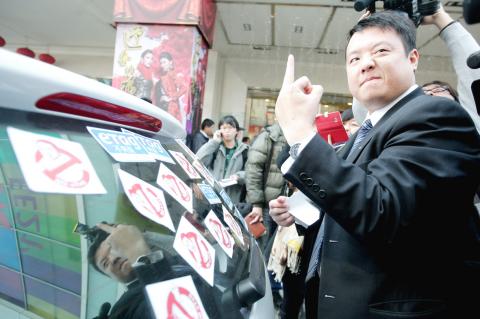Dozens of protesters took to the streets and national freeways yesterday to show their anger at the new distance-based electronic toll collection system, with some calling for the nationalization of the system should problems persist.
Led by Tainan City Councilor Wang Ding-yu (王定宇) of the Democratic Progressive Party, about 100 motorists from the Greater Tainan drove up National Freeway No. 1 without an eTag, the small vehicle ID card affixed to the vehicle’s windshield or headlight that is used for electronic toll collecting.
Instead, their cars sported stickers declaring: “Too pissed for eTag.”

Photo: CNA
The protests came after numerous problems with the electronic toll system were reported, although some cases were exaggerated.
Problems have included erroneous eTag detections and calculations, shoddy customer service and a cellphone application that proved woefully ineffective handling the millions of highway users in the nation.
During the protest in Greater Tainan, Wang listed the advantages of driving without an eTag, including paying after receiving an itemized bill, which would ensure mistakes could be avoided.
Similar freeway protests led by local politicians took place in Greater Kaohsiung and Yilan County.
In Taipei’s Ximending District (西門町), dozens of protesters gathered in front of a Far Eastern Group department store, which is run by the parent company of the toll collection system’s operator, Far Eastern Electronic Toll Collection Co (FETC). The protesters affixed stickers to the store’s glass doors.
About a dozen activists representing Youth Labor Union 95, Trade Union of Electrical, Electronic and Information in Taiwan, and an anti-eTag alliance, gave out stickers that again read: “Pissed off and will not use eTag,” or “No eTag.”
Advocates of workers’ rights and some toll collectors who have lost their job since the new tolling system was officially launched on Jan. 2 threw their support behind the protest.
The Youth Labor Union 95 said that Far Eastern Group signed a contract with the National Freeway Bureau to establish the new system 10 years ago, but that it had still has not gained the public’s trust.
The eTag system will affect people’s right to privacy and free movement because vehicle location data can be collected through the system, which makes it equivalent to being monitored while driving on the freeway, the union said.
The alliance also encouraged the public to cancel their eTags because the Far Eastern Group did not honor its commitment to help displaced freeway toll collectors find new jobs.
The anti-eTag alliance said while public remarks made by the Far Eastern Group recently seemed to imply drivers cannot go on the freeway without an eTag, this was not the case.
The public should be aware that it is possible to use the freeway without an eTag, and be billed later, the group said.
Alliance spokesperson Shen Tsung-han (沈宗翰) also said that under the Highway Act (公路法), there must be no discount discrimination between people who use an eTag and those who refuse to use it, so those without the eTag should be entitled to the 20km toll-free discount and the 10 percent discount on toll fees starting from July.

CHAMPIONS: President Lai congratulated the players’ outstanding performance, cheering them for marking a new milestone in the nation’s baseball history Taiwan on Sunday won their first Little League Baseball World Series (LLBWS) title in 29 years, as Taipei’s Dong Yuan Elementary School defeated a team from Las Vegas 7-0 in the championship game in South Williamsport, Pennsylvania. It was Taiwan’s first championship in the annual tournament since 1996, ending a nearly three-decade drought. “It has been a very long time ... and we finally made it,” Taiwan manager Lai Min-nan (賴敏男) said after the game. Lai said he last managed a Dong Yuan team in at the South Williamsport in 2015, when they were eliminated after four games. “There is

Taiwan Semiconductor Manufacturing Co (TSMC, 台積電) is expected to start construction of its 1.4-nanometer chip manufacturing facilities at the Central Taiwan Science Park (CTSP, 中部科學園區) as early as October, the Chinese-language Liberty Times (the Taipei Times’ sister newspaper) reported yesterday, citing the park administration. TSMC acquired land for the second phase of the park’s expansion in Taichung in June. Large cement, construction and facility engineering companies in central Taiwan have reportedly been receiving bids for TSMC-related projects, the report said. Supply-chain firms estimated that the business opportunities for engineering, equipment and materials supply, and back-end packaging and testing could reach as high as

POWER PLANT POLL: The TPP said the number of ‘yes’ votes showed that the energy policy should be corrected, and the KMT said the result was a win for the people’s voice The government does not rule out advanced nuclear energy generation if it meets the government’s three prerequisites, President William Lai (賴清德) said last night after the number of votes in favor of restarting a nuclear power plant outnumbered the “no” votes in a referendum yesterday. The referendum failed to pass, despite getting more “yes” votes, as the Referendum Act (公民投票法) states that the vote would only pass if the votes in favor account for more than one-fourth of the total number of eligible voters and outnumber the opposing votes. Yesterday’s referendum question was: “Do you agree that the Ma-anshan Nuclear Power Plant

Democratic nations should refrain from attending China’s upcoming large-scale military parade, which Beijing could use to sow discord among democracies, Mainland Affairs Council Deputy Minister Shen You-chung (沈有忠) said. China is scheduled to stage the parade on Wednesday next week to mark the 80th anniversary of Japan’s surrender in World War II. The event is expected to mobilize tens of thousands of participants and prominently showcase China’s military hardware. Speaking at a symposium in Taichung on Thursday, Shen said that Chinese Minister of Foreign Affairs Wang Yi (王毅) recently met with Indian Prime Minister Narendra Modi during a visit to New Delhi.